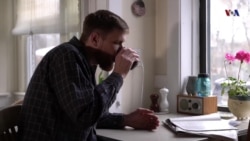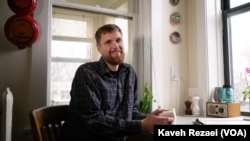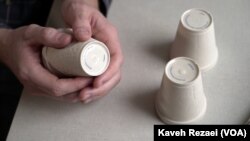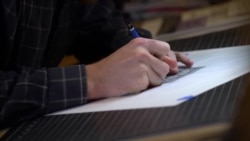In Iraq, tea is much more than a drink. It is part of the culture, a ritual with both personal and social significance.
But American activist and Army veteran Aaron Hughes did not know much about tea until the age of 20. That year, in 2003, Hughes was deployed by the Illinois National Guard to fight in Iraq. The whole time he was there, Hughes says, Iraqis would offer him the hot, sweet drink.
“These are guys hauling our supplies because they’re country nationals, and we make them stay outside the compound post because they are a security threat. And despite all that, you know, these men that had nothing would turn to us and offer us tea, and we would refuse.”
Refusing tea was what Hughes was ordered to do.
“It could be a security threat,” he says. “And so I never had tea. My entire deployment. Not once, despite being offered.”
Hughes says that, during his time stationed in Iraq, he became disillusioned.
“I joined the Illinois Army National Guard so I can serve my country, my community and provide humanitarian aid, but I am not doing that,” Hughes says.
Hughes called some of his work in Iraq “destructive and dehumanizing.”
So in 2004, when Hughes returned to the United States, he made a dramatic career change. He attended the University of Illinois and became an artist.
“I want to be a part of something creative,” he says. “I have to commit myself to using art and creative practices to counter the destruction that's perpetuated so much in our society and our world.”
Hughes decided to devote his life to antiwar art. One of his first projects was inspired by the drink he had refused so many times.
“After a return trip to Iraq, as a civilian in 2009, it was during this trip that I had tea offered to me in the Iraqi tradition,” Hughes explains. “And for the first time, I accepted the dark, sweet tea.”
In response, Hughes created the Tea project. The Tea project allows people to gather, sip tea and share stories and experiences about their personal relationship to love, war and detention.
Artist Amber Ginsburg joined Hughes on the project in 2013.
Hughes says the tea cups are based on a story from a friend, Chris Arendt, who is involved with Iraq Veterans Against the War.
“Chris was a former Guantanamo detention camp guard. And each detainee was allowed to have one styrofoam cup of tea. And they would take these styrofoam cups and start drawing and scrawling all over these cups. As soon as they make a mark on the cup it was seen as contraband,” says Hughes. “So his job was to go around and confiscate these cups bring them down to military intelligence who would analyze them, take pictures of them and then throw them away. And he said every single time he would go pick up those cups all over them would be drawings of flowers. Just flowers.”
So, at each tea performance, tea is served in a styrofoam cup. Eventually, the styrofoam cup was transformed into cast porcelain cups created by the collaboration of Ginsburg and Hughes. Together, they archived over 700 cast porcelain styrofoam teacups, one for each of the individuals that have been detained at Guantanamo Bay detention camp, a U.S. military prison.
Hughes has traveled the United States and the world hosting Tea project performances. During these gatherings, stories about the ongoing Global War on Terror are shared and expressed.
Hughes sums up his vision:
“Tea creates an occasion for community and for a shared moment that transcends cultural divides and systems of oppression. It’s a space for having conversations together.”









